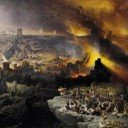Since we spent quite a bit of time dealing with this passage in the introductory posts on the Olivet Discourse I will treat this portion as simply a review. I will bullet point the important parts of the passage and discuss the arguments used by futurist and Dispensationalist.
DISPENSATIONAL INTERPRETATION
Though not every Dispensationalist would agree with every aspect of this bullet point review of the Dispensational Interpretation, but this would be the view most in the pews of a Dispensational Church would accept.
- Israel is represented by the Fig Tree
- The Fig Tree budding is Israel becoming a nation again. This is dated normally in 1948 with the United Nation charter giving certain land and national privileges to the newly reformed nation of Israel.
- Some date in 1967 and the victory of the six day war.
- These dates began the “terminal (last) generation. Originally believed to last 40 years, after the dates passed the length of the generation has continued to expand
- The “all these things” would be seen by this terminal generation
- The rapture will take place seven years before the end of that generation
- Generation may also be interpreted to mean “Jewish race”
The problems with the view above are multiple and have been dealt with previously. A bullet point review below will highlight the issues.
- The world translated generation is “genea” which people alive at the time of the speaker or writer.
- The term “genos” means race or peoples and that word is not used
- Every other time the term this generation is used in Matthew (including the immediate context of Matthew 23) it always means the contemporary generation
- The parallel passage in Luke mentions the “fig tree and ALL the trees.” There is nothing special about the fig tree, Matthew simply refers to Jesus’ words by stating the fig tree only.
- The issue isn’t the fig tree itself, but that the reader understand that like when they see a budding of tree they know summer is near, that when they see these events know the end is near
- The fig tree is not the Biblical representative of Israel. If anything, the Olive tree has more Biblical precedent
- If the Dispensationalist is consistent he must answer the question about another “fig tree” that Jesus curses and says that it will never bare fruit again. If consistent he must also argue this represents Israel and that Israel will never bare fruit again…let alone bud!
So again, for further treatment I would recommend checking the earlier posts, but hopefully this review proved “fruitful.”





No comments:
Post a Comment